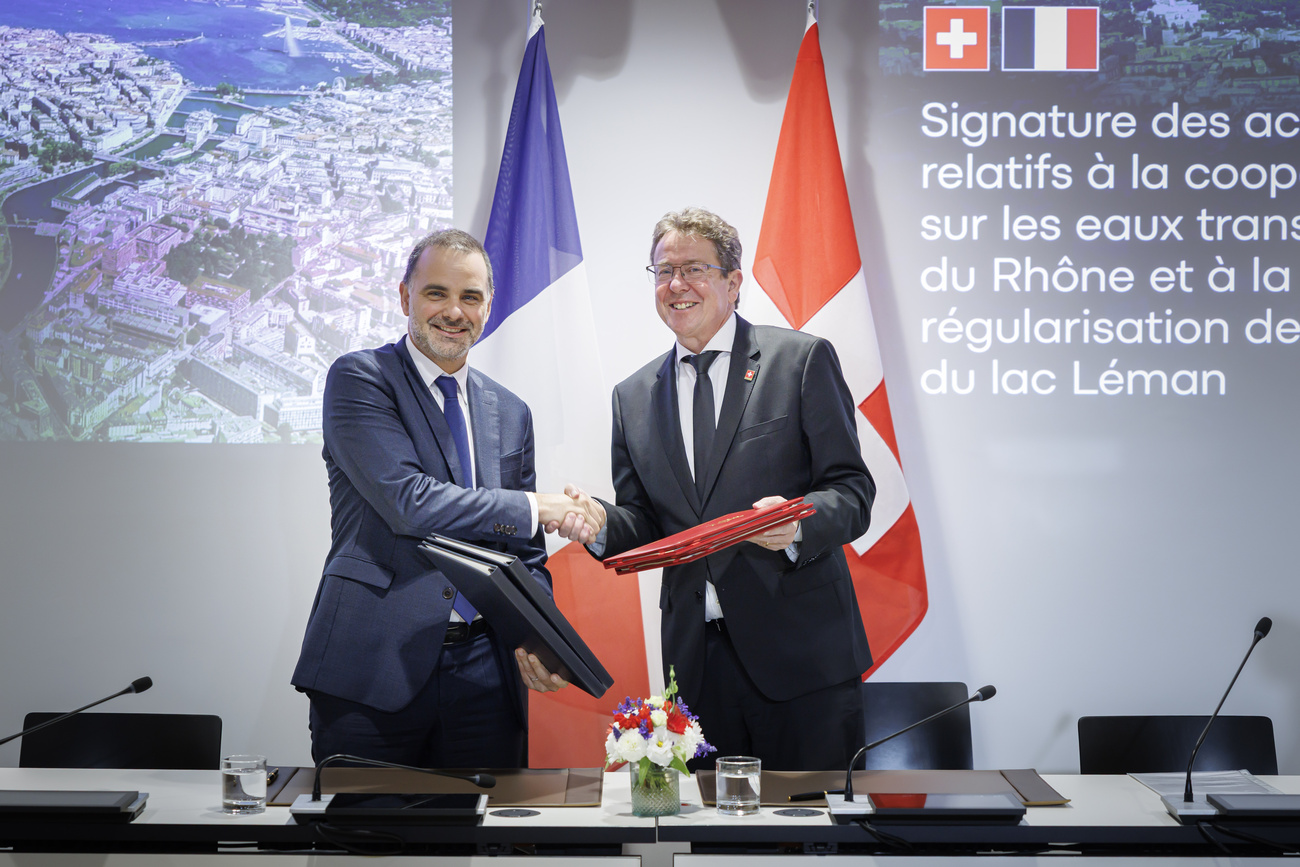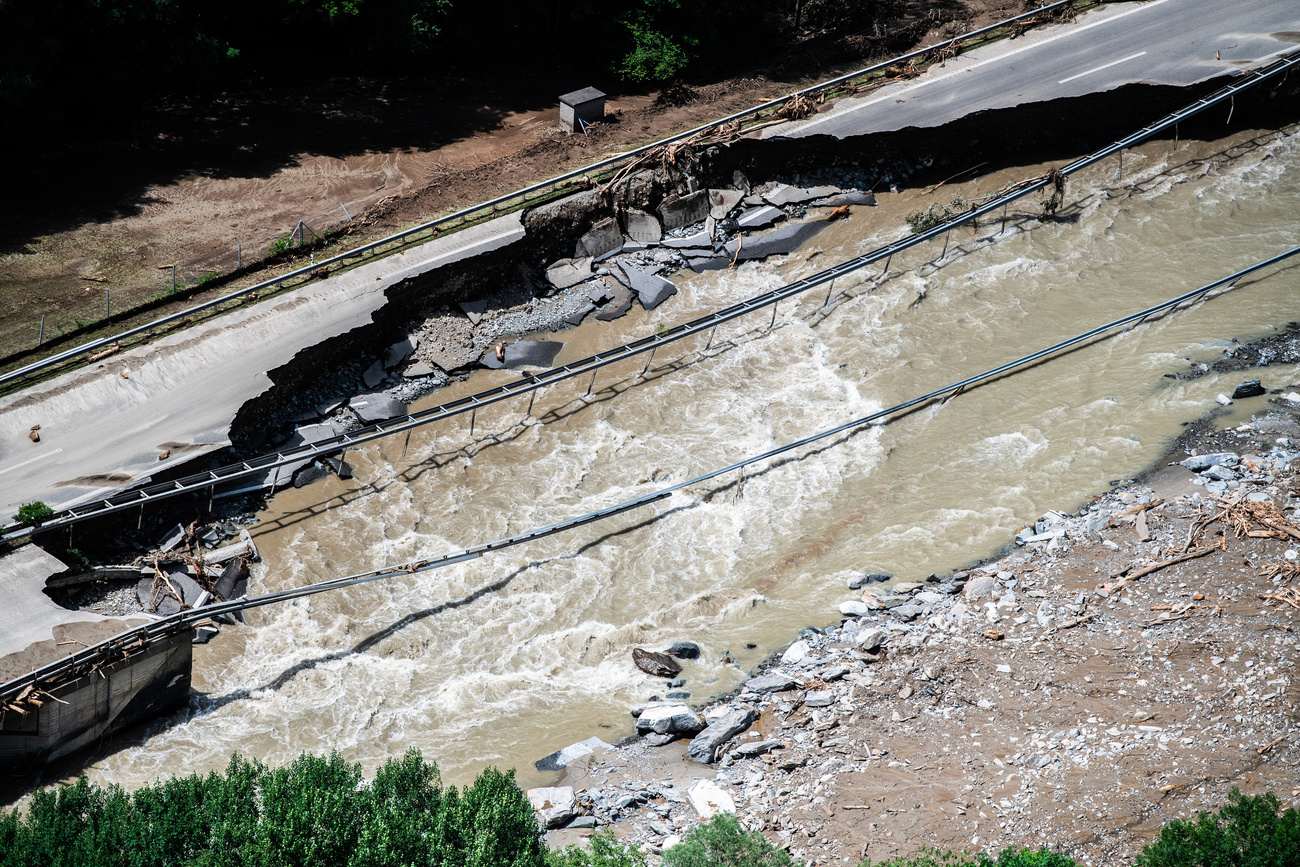
Switzerland and France sign accords to manage shared waters

Switzerland and France have signed two agreements on the management of the waters of the Rhône River and Lake Geneva, almost 14 years after discussions on the subject began. Climate change is making water management a major issue in cross-border policy.
+Get the most important news from Switzerland in your inbox
The texts were signed on Thursday in Geneva by Swiss Environment Minister Albert Rösti and Laurent Saint-Martin, the French Minister-Delegate for Foreign Trade and French Nationals Abroad. The overall aim of the two agreements is to coordinate the sustainable management of these waters, including during exceptional situations such as floods and droughts.
Rösti expressed his “great satisfaction” on Thursday at this “major step forward in cross-border cooperation on water”, adding these were two “essential agreements”.
Another agreement on horizon
For his part, Saint-Martin stressed the importance of these agreements, particularly for local residents, the environment, biodiversity and ecosystems. “These agreements mark a new phase in Franco-Swiss cooperation,” he said. He emphasised the shared determination to face up to the challenges of climate change.
+ Scientists explain Lake Geneva’s unique carbon footprint
“Switzerland is ready to implement these two agreements rapidly over the coming months,” said Rösti. It should be noted that the signing of these two texts could be followed “very shortly” by the conclusion of a cross-border agreement on the management of the waters of the Doubs River. Switzerland and France were hopeful of a favourable outcome to these ongoing negotiations.
Cooperation units
The agreement on cooperation over the cross-border waters of the Rhône provides for the creation of a new framework commission, which will provide an overall view of the issues. It will oversee the 30 or so bodies already working on managing the waters of the Rhône. The chair will be held at ministerial level, alternating between the two states.
The second agreement provides for close cooperation on the waters of Lake Geneva, particularly in the event of a crisis, such as drought or flooding. It is planned to set up cooperation units depending on the level of crisis to be managed. The aim is to protect local residents and uses from potential damage.

More
How Switzerland is trying to defeat extreme weather events
The probability of extreme events, in the form of low water or floods, as in 2021 and 2024, is high, according to the French minister, who pointed out that climate change has already profoundly affected the hydrology of the river. “Neither country has all the answers to these problems,” he added.
No minimum threshold
Discussions between the two countries began in 2011, when France officially asked Switzerland to set up a system to govern the waters of the Rhône. That same year, the French nuclear power plant at Bugey had experienced problems with its cooling system following a severe drought. Geneva had reduced the flow of the Rhône to maintain the level of the lake.
+ Switzerland and France ‘have shaped each other profoundly’
During the negotiation process, Swiss representatives often reiterated that there was no question of guaranteeing a fixed river flow. Questioned on this point at the end of the official ceremony, Rösti stressed that no concrete threshold had been defined. “France would have liked to define a minimum water flow”, he pointed out, but Switzerland did not accept this.
Translated from French with DeepL/gw
We select the most relevant news for an international audience and use automatic translation tools to translate them into English. A journalist then reviews the translation for clarity and accuracy before publication.
Providing you with automatically translated news gives us the time to write more in-depth articles. The news stories we select have been written and carefully fact-checked by an external editorial team from news agencies such as Bloomberg or Keystone.
If you have any questions about how we work, write to us at english@swissinfo.ch.

In compliance with the JTI standards
More: SWI swissinfo.ch certified by the Journalism Trust Initiative





























You can find an overview of ongoing debates with our journalists here . Please join us!
If you want to start a conversation about a topic raised in this article or want to report factual errors, email us at english@swissinfo.ch.